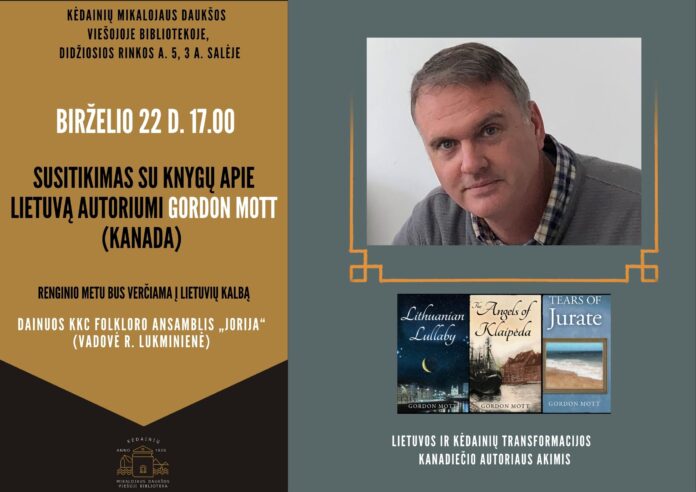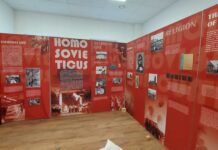
Gordon Mott’s novels inspired by Lithuania’s transformation into a confident and courageous European nation, attract audience in Kėdainiai
By Kristina Jaugelis
Gordon Mott, an English-speaking writer has published his third novel set in the Lithuania of the early 1990s, drawing inspiration from the people he met and their powerful stories while living in Klaipėda and teaching English there during that time.
On the afternoon of June 22, 2022, Gordon Mott gave a talk about the people and events that inspired his books at the Mikalojus Daukša Public Library in Kėdainiai. The talk focused on his trio of historical novels, and the changes he has witnessed over three decades of work and travel to Lithuania. Lithuanian-speaking readers can read a detailed account of his talk in this article from the Kėdainiai news site Rinkos Aikštė, and view media coverage of the event on the June 29 edition of Kėdainių Žinios.
I have drawn from these sources and also on a conversation I had with Gordon on July 10 to introduce TŽ English-speaking readers to Gordon’s work.
At the talk in Kėdainiai, Gordon delivered his remarks in English while his spouse, Asta Mott, an Oxford alumna and professional translator, provided live interpretation into Lithuanian. A folk ensemble choir performed for the occasion and local media were on hand to document the event, which drew attendees from as far as Vilnius.
Rewind nearly 30 years and it becomes obvious why this cultural exchange is emblematic of the writer’s life. Gordon went to work in Lithuania in the 1990s as an English teacher. His life has been linked with Lithuania ever since. A political science graduate of Trent University, Gordon was intrigued by the social, economic, and political developments sweeping through Eastern Europe. On the suggestion of a Lithuanian exchange student—Darius—whom he befriended at university, Gordon travelled to Lithuania in the summer of 1993. He had been offered a teaching position by the Ministry of Education at Donelaičio mokykla (now Vytauto Didžiojo gimnazija) which his friend Darius helped to arrange. Over a year of living and working in Klaipėda, he fell in love with Lithuania, and met his future spouse, Asta.
As a writer, Gordon has returned to this period in his three novels to tell stories of life, love and friendship that would not have been possible without a meeting of East and West. Lithuanian Lullaby (2021) follows the lives of six people as they navigate their personal lives in the decade between 1987 and 1997. The three storylines in the book all intersect with Lithuania. Angels of Klaipeda (2021) tells the story of a husband who goes missing in the Middle East, and of his wife who returns to her homeland of Lithuania to begin a new life only to have it upended when her husband unexpectedly reappears. His most recent book, Tears of Jurate, (2022) follows one woman as she tries to make a living selling goods in market stalls and markets, amidst mafia interference, corruption and other dangers, including a violent incident that leaves Jurate close to death. Only recently has Gordon revealed that Jurate is based on a living person. Her experiences, both shocking and bizarre, are truly compelling. In the book Jurate, like her mermaid goddess namesake, withstands all manner of tribulations, and like Lithuania, she endures.
Gordon looks back on the tumultuous and transformative 1990s and finds little resemblance to the modern Lithuania of today, a comparison he was quick to make during his talk. He described the taxing living conditions and low wages that most citizens endured in those times, in contrast with the much improved social and economic opportunities afforded Lithuanians today. Even the town of Kėdainiai, now clean and safe, with a lovingly restored old town, is symbolic of these changes. “There is an idea of civil society now,” Gordon explains. However, he also remembers the 1990s as a time of hope and rebirth. When asked what draws readers in Lithuania to his English language books, he responds that the time may be ripe to reflect on that period, acknowledging the factor of nostalgia for why his books are attracting readers from both outside and inside Lithuania.
Gordon’s books also continue to draw attention and readers from across North America, where there is a large Lithuanian diaspora. The fact that Lithuania is still mysterious to most Westerners is not lost on him. “The stories in Lithuania are beautiful,” Gordon explains. “Those stories don’t exist in the English-speaking world.” From ancient myths about sea goddesses, to the multi-linguistic, multi-ethnic, religiously diverse Grand Duchy of Lithuania, to Lithuania’s 20th Century lived experience of oppression, occupation, and resistance, those stories are not only rich in symbolism but in historical significance, and draw readers curious about Lithuania and the Baltics to his books.
When I asked Gordon what Lithuania has to offer the world today, he pauses for a moment before answering. “In my childhood, there was something that represented freedom to the world: Berlin. Shrouded by communism, Berlin represented a ray of hope. When you see Lithuania surrounded by Kaliningrad and Belarus today, it offers freedom of religion and movement and speech. It is a new Berlin, it is a light of hope in a sea of darkness.” He goes on to describe the strong opposition to the war in Ukraine that Lithuania has demonstrated to the world. “They have stepped up to that. They have shown strong support for their Ukrainian brothers and sisters, even to their own detriment. “Don’t inflame the bear”, the Germans say. Lithuanians are stronger in their history. Their attitude is—[Russians] will attack either way, we might as well be on the side of right.”





























